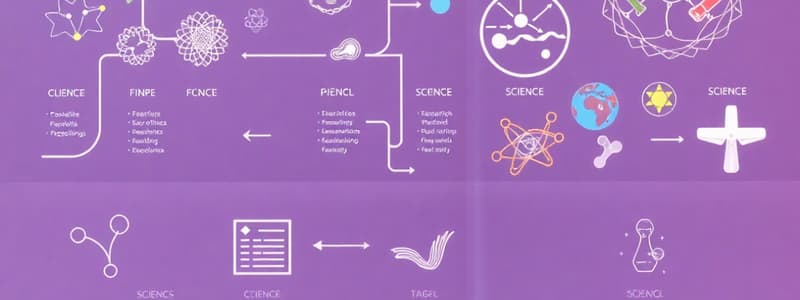Podcast
Questions and Answers
Which branch of science includes the study of human behavior and social structures?
Which branch of science includes the study of human behavior and social structures?
- Natural Science
- Social Science (correct)
- Humanities
- Formal Science
What distinguishes a hypothesis from a theory in scientific inquiry?
What distinguishes a hypothesis from a theory in scientific inquiry?
- A hypothesis is a testable prediction; a theory is a well-supported explanation. (correct)
- Both are the same in scientific terms.
- A hypothesis is a well-supported explanation, but a theory is simple.
- A hypothesis is a proven fact while a theory is not.
Which figure is NOT associated with the first scientific revolution?
Which figure is NOT associated with the first scientific revolution?
- Isaac Newton (correct)
- Nicolas Copernicus
- Galileo Galilei
- Charles Darwin
What is the primary focus of the field of geology?
What is the primary focus of the field of geology?
In the context of technology, what does 'development' refer to?
In the context of technology, what does 'development' refer to?
What is a characteristic of First Wave Technology?
What is a characteristic of First Wave Technology?
Which of the following represents a potential scenario for the end of the world?
Which of the following represents a potential scenario for the end of the world?
What is the first step in the scientific inquiry process?
What is the first step in the scientific inquiry process?
Which of the following disciplines primarily studies living organisms?
Which of the following disciplines primarily studies living organisms?
What is the main characteristic of Third Wave Technology?
What is the main characteristic of Third Wave Technology?
Flashcards are hidden until you start studying
Study Notes
Definition of Science
- Science is a systematic body of knowledge about the natural world, developed using the scientific method.
Branches of Science
- Natural Sciences: Include disciplines like Biology and Physics, focusing on physical universe laws.
- Social Sciences: Examine human behavior and societies, with Sociology as a key example.
- Humanities: Investigate aspects of human culture, including philosophy and history.
Examples of Disciplines
- Biology: Encompasses Zoology (study of animals) and Botany (study of plants).
- Physics: Covers fields like Chemistry (study of substances) and Astronomy (study of celestial bodies).
Origin and Study of the Universe
- Origin of the Universe: Investigated primarily through Astronomy.
- Origin of Planets: Explored using Geology (study of the Earth) and Meteorology (study of weather).
- End of the World Scenarios: Considerations include Nuclear war, pandemics, and ecological collapse.
First Scientific Revolution
- Key Figures: Notable scientists include Galileo Galilei (telescopic innovations), Nicolas Copernicus (heliocentric model), and Charles Darwin (theory of evolution).
- Contributions: Their work laid foundational principles for modern science.
Scientific Inquiry
- Process: Involves forming observations, hypotheses, testing, and data analysis.
- Hypothesis vs. Theory: Hypotheses are testable, while theories are comprehensive explanations.
- Hypothesis Testing: Uses experimental and comparative methods to ascertain validity.
Steps of Scientific Inquiry
- Problem Identification: Define a specific issue to investigate.
- Research: Collect relevant data and background information.
- Hypothesis Formation: Create predictive, testable statements.
- Testing the Hypothesis: Execute experiments and evaluate outcomes.
- Conclusion: Decide whether to accept or reject the hypothesis based on evidence.
- Communication: Share findings and solicit critical feedback.
Technology
- Definition: Practical implementation of knowledge in fields like industrial arts and manufacturing.
- Technology Process: Encompasses identification, conceptualization, production, and application phases.
Development vs. Innovations
- Innovations: Transform prototype inventions into commercially viable products.
- Development: Converts research discoveries into new materials, devices, or processes.
Classification of Technology
- First Wave Technology: Characterized by pre-industrial, labor-intensive practices.
- Second Wave Technology: Features industrial, capital-intensive methods rooted in classical principles.
- Third Wave Technology: Represents a post-industrial phase, reliant on contemporary scientific knowledge.
Society
- Definition: A community of individuals living together with shared objectives.
- Evolution of Societies: Societal development has progressed from hunter-gatherer groups to complex manufacturing and processing systems.
Studying That Suits You
Use AI to generate personalized quizzes and flashcards to suit your learning preferences.




